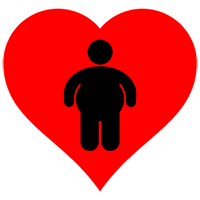
Your complimentary articles
You’ve read one of your four complimentary articles for this month.
You can read four articles free per month. To have complete access to the thousands of philosophy articles on this site, please
Modern Moral Problems
The Ethics of Fat Shaming
Charlotte Curran tells us precisely why fat shaming is unethical.
Fat people are perhaps the most openly stigmatized individuals in our society: there is data which suggests that weight stigma is more pervasive and intense than even racism and sexism. There is certainly a well-documented social and cultural bias against fat people, particularly in the workplace, the medical sphere, and the media.
In the workplace, discrimination exists with respect to hiring, wages, promotion, and termination. Workplace discrimination is examined in detail by John Cawley in his 2004 paper, ‘The Impact of Obesity on Wages’ (Journal of Human Resources vol. 39, issue 2). Cawley found that fat white females earn 11.2% less than their non-fat counterparts. In the medical sphere, fat oppression is also very much present: in one study, over 40% of physicians were found to have a negative reaction towards obese patients and may be dissuaded from suggesting or performing certain procedures on them (‘Physicians’ attitudes about obesity and their associations with competency and specialty: a cross-sectional study’, M. Jay et al, 2009). There are endless examples of weight bias in the media: from ‘fat Monica’ in Friends to The Biggest Loser and The Nutty Professor, fat people are depicted in a variety of degrading ways. Fat characters in TV and film are more likely to be seen eating and to be the objects of humour compared to their thinner counterparts, highlighting that even when fat bodies are represented, these characters are usually depicted as unattractive, ridiculous, contemptible, even gross and disgusting. These alarming facts indicate that fatism is not considered a serious form of prejudice, perhaps due to its normalisation or to the vast attempts to justify this oppression.

Who says big isn’t beautiful? Not Renoir… Woman Combing Her Hair, 1907
There have been attempts to ethically justify fat shaming as being motivated by a desire to achieve a greater good – namely, improved physical health or well-being. These ‘greater good’ arguments assume that the intentions behind fat-shaming are often positive, aiming to inspire individuals to make healthier choices which could contribute to a better quality of life.
The positive case for fat shaming is particularly interesting to investigate because the belief that weight loss results in a better quality of life underpins our everyday practices pertaining to fatness. The idea that being overweight is bad for us is evident for instance in the popularity of calorie counting app MyFitnessPal, with 19.1 million active monthly users in 2018, or with weight loss products such as detox teas, meal replacement shakes, and even appetite suppressant lollipops, which generate an estimated $37.5 million in yearly revenue for lifestyle brand Flat Tummy Co. However, acts of fat shaming underpin weight loss support groups, which use public weigh-ins, positive reinforcement, and rewards, as motivation for individuals to achieve their weight loss goals. The notion of accountability in such groups is an implicit example of fat shaming. If someone is held accountable or responsible for their weight loss journey, the fear of people’s reaction on social media or other members of their support group knowing that they have failed will provide motivation for persisting. Here social stigma is seen as a positive motivating force that will help us achieve our weight loss goals. If we associate weight loss with positive consequences, such as an improvement in an individual’s overall health and quality of life, then in these instances fat shaming could be seen as justified in order to improve someone’s life.
Although this rationale may intuitively seem correct, let me present reasons why this view is misguided, and why a competing moral demand should take precedence.
Bad Fat Shaming Arguments
The arguments which attempt to justify fat shaming in order to achieve an overarching greater good are unsuccessful for many reasons. First, they depend on the assumptions that fat shaming is an effective means of getting people to lose weight, and that weight loss makes one physically healthier – both of which can be contested. In fact, fat shaming has been argued to be not only an ineffective means of getting people to lose weight, but it can potentially achieve the opposite. A population survey conducted by University College London in 2014 concluded that fat shaming not only does not encourage weight loss, but discovered that those who reported weight discrimination gained more weight than those who did not (Obesity Journal vol.22, S.E. Jackson, R.J. Beeken, and J Wardle). The report concluded that weight discrimination is a part of the obesity problem and not part of the solution. Additionally, N.A Schvey’s et al’s 2011 study, ‘The Impact Of Weight Stigma On Caloric Consumption’, suggests that among overweight women, exposure to weight stigmatizing material may lead to increased caloric consumption.
The belief that weight loss leads to increased well-being can have adverse effects on children, too. In 2019, Weight Watchers launched an application called Kurbo intended to promote healthy eating habits from an early age. It’s for children aged eight to seventeen, and encourages them to track their food intake. The app prescribes a ‘traffic light’ system for food: green items can be eaten freely; yellow should be consumed in moderate portions; and red should encourage a child to ‘stop and think’ before eating. Weight Watchers have come under fire for actively enforcing the stigma of obesity, which may, as a consequence, lead to children developing disordered eating and unhealthy relationships with food. In light of this, as of April 2021, a Change.org petition to remove the app had collected 114,525 signatures.

…nor Rubens. The Holy Family with St Anne (detail), 1630
With these matters in mind, A. Janet Tomiyama and Traci Mann’s 2013 paper, ‘If Shaming Reduced Obesity, There Would Be No Fat People’, makes the plausible claim that if stigmatizing fat people worked, it surely would have done so by now.
A second reason the greater good arguments are misguided, is that we are rarely in a good position to know someone’s underlying health conditions. Nor can we assume an individual’s lifestyle from their appearance alone. The common stigma behind fatness assumes that weight gain is caused simply by laziness or a lack of self-control, but this is not necessarily the case. Along with diet choices and lifestyle habits, body size can also often be influenced by metabolism, genetics, sleep, medication, financial stability, mental health, or pre-existing health conditions such as hypothyroidism. This shows that the ‘solutions’ to weight gain are not always as straightforward as eating less or exercising more. Rather, fatness is a complex socio-economic, psychological, and physiological phenomenon. The causes of fatness are diverse and often not a matter of individual choice – which once again demonstrates that fat shaming is not an effective or appropriate way of decreasing fatness. This raises serious doubts concerning the greater good argument, because claims that the intentions of fat shaming are generally positive and well-meaning lacks their major justification – that there are good outcomes of fat shaming.
The Immorality of Fat Shaming
I wish to take these thoughts one step further by arguing that fat shaming is not only unproductive, but morally impermissible. It is for instance unethical to shame an individual for circumstances beyond their control – especially when weight gain is a consequence of complex trauma or personal difficulties. But even in instances where an individual is in control of their weight, it is morally impermissible to fat shame, firstly due to the discrimination that these practices perpetuate, but also because it is a serious burden to place upon an individual. Weight loss is a burden as it is not a quick fix, is mentally challenging, and often requires time, money and will-power. So fat shaming manipulates people into feeling that they need to change, either concerning something they have no control over, or concerning something they can control, but which places a serious burden upon them.
Our attitudes toward healthy eating and dietary choices are increasingly important components of how we conceive of and judge ourselves and others. In this context, let me introduce orthorexia, a condition which might be thought to constitute an internalisation of the ideology behind fat shaming. Orthorexia Nervosa, meaning ‘correct eating obsession’, is a condition in which the subject becomes obsessed with identifying and maintaining the ideal diet. An orthorexic individual typically avoids both pleasure and experimentation in eating by rigidly avoiding foods generally perceived as unhealthy. In her paper, ‘Eat Y’self Fitter: Orthorexia, Health and Gender’ in The Oxford Handbook of Food Ethics (edited by Anne Barnhill, Mark Budolfson, and Tyler Doggett, 2017), Christina Van Dyke discusses society’s obsession with health using orthorexia as her central focus of study. She argues that orthorexia is a manifestation of age-old anxieties about human finitude and mortality, which twenty-first century Western culture is prone to obsess about.
Van Dyke raises the interesting point that orthorexia often tends to involve a sense of moral superiority, evoked when someone adheres to their idealised diet. In the book, Health Food Junkies Overcoming the Obsession with Healthful Eating (2001) Steven Bratman and David Knight agree that unlike other eating disorders, orthorexia disguises itself as a virtue; but one where the subject gradually places healthy eating above other values. Eventually, the quality of what they consume and the purity of their diet become more important to the orthorexic than personal moral values, interpersonal relations, career plans, and social relationships, as food becomes the focus of their life. It is thus unsurprising that recovering orthorexic Edward Yuen has said that orthorexia ultimately worsens the experience of the rest of your life.
Fatness & Freedom
I would say that the core reason fat shaming is unethical is because it’s a malign restriction of a person’s freedom. Fat shaming limits personal freedom first because it results in deformed desires, which is significant for issues such as autonomy, agency, and responsibility.
In his book Sour Grapes: Studies in the Subversion of Rationality (1983), Jon Elster explains that a person acquires deformed desires as they adapt their preferences without their control, or even awareness. Deformed desires also typically involve deception about what an individual truly wants, or what is truly in their interest or will promote their welfare. Desires are deformed in response to unjust social conditions. This seems particularly appropriate to this discussion since, as I noted, fat people are the most openly stigmatized individuals in our society.
Deformed desires constitute a restriction of autonomy because they are not chosen and so are not an indication of an individual’s self-determination, but rather, indicate the individual’s subordination to the dominant culture and its ends. The sentiments behind fat shaming both simultaneously create and are reinforced by the cultural oppression of fat people. From this we can conclude that fat shaming satisfies the conditions for something that deforms desires – such as adapting an individual’s preferences without their control, or deceiving them into believing that losing weight will promote their welfare. Fat shaming is responsible for deforming desires by reinforcing the distaste for fatness, thus constituting a malign social pressure, and so presenting a threat to personal autonomy.

Graphic © Eric Faust
The second reason fat shaming threatens personal autonomy is because it involves an imposition of values. Here individuals have projected onto them other peoples’ beliefs about what their priorities in life should be. Culturally extant beliefs concerning bodies and health – that is, the fashionable distaste for fat bodies – emphasises the importance of our appearance, dictates what kind of bodies are ‘good’ and ‘bad’, associates weight loss with improved well-being (falsely, as we have seen), and consider fatness a physical state to be ashamed of. The cultural enforcement of these values affects a person’s ability to act according to their own reasons because they are being insistently told what they should or should not eat, how much they should eat, and that the size of their body should be one of their main concerns. It is undeniably difficult for any individual to make free choices when the sentiments of others are repeatedly imposed upon them in this way, when they are negatively judged for their choices and lifestyle habits, and especially when they’re ostracised for the way that they look. To put this into context, imagine the experience of someone who is subject to fat shaming: they experience daily discrimination from their community, while the media is saturated with weight loss advertisements, negative representations of fat bodies, and positive representations of thin bodies. Someone has to be almost impossibly strong-willed and self-confident under these circumstances to feel comfortable enough in their own body to only ever decide to make changes to their body in response to their own genuine desires despite all of these manipulating forces. It is a great challenge to resist internalising the aesthetic ideal of thinness because the stakes for being perceived as attractive are extremely high, and the dominant standards of attractiveness in Western society are skewed toward an aversion to fat bodies. It is therefore morally impermissible to fat shame because fat shaming enforces a specific value system onto others, resulting in individuals pursuing ends that they would not have pursued naturally or from their own motivations, but rather as a consequence of being coerced or manipulated into abiding by the dominant standards of attractiveness in society.
Conclusions
Fat shaming supports the perpetuation of malformed ideals, and attempts to condition people into adopting the sentiments which underpin fat oppression. If we internalise these sentiments, a natural consequence is that we adopt the skewed value system which is starkly highlighted in orthorexia, prioritising health, physical appearance, and body weight above genuine moral values. This defective value system can lead to disorders where one becomes obsessive in behaviours concerning food, exercise, or health, and this can have severe, sometimes fatal consequences. The common ideology which underpins both orthorexia and fat shaming should thus be resisted. Another potentially dangerous result of internalising common social beliefs concerning health and fatness, is that healthy or thin people are considered more morally virtuous than unhealthy or fat people.When attractiveness and physical health are considered virtues, any real virtues which would more likely promote well-being for an individual – such as friendship, dignity, or honour – are undermined. And if health does happen to be an important value to an individual, it is appropriate only when it is result of self-determination, and not when it is a consequence of deformed desires or malformed tastes. Therefore the belief system which motivates fat shaming influences a skewed value system, which can lead to eating disorders and obsessive behaviours, as well as restricting the ability for individuals to determine their own priorities in life. It is inconsistent with a fully developed personal autonomy.
© Charlotte Curran 2021
Charlotte Curran is an MA student at the University of Manchester, and a graduate of the University of Edinburgh, specialising in the Philosophy of Mental Health.









